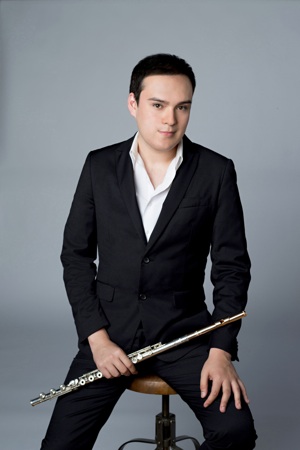A musical frolic in the South Bay
One of the most seriously experimental—and fun—concerts I’ve heard in a while took place in an out-of-the-way church east of San Jose. Last Tuesday, June 18, the Alum Rock Methodist chapel held the opening of the Silicon Valley Music Festival, marking the second year of a new South Bay venture.
 Ray Furuta, flutist and Artistic Director, programmed a week of concerts in venues around San Jose that nicely balanced winds and unconventionality. He described Tuesday’s New Music concert as “a potpourri,” an apt description of works that ranged from French colorist Messiaen to political activist Rzewski, and from the obscure to the famed.
Ray Furuta, flutist and Artistic Director, programmed a week of concerts in venues around San Jose that nicely balanced winds and unconventionality. He described Tuesday’s New Music concert as “a potpourri,” an apt description of works that ranged from French colorist Messiaen to political activist Rzewski, and from the obscure to the famed.
Percussionist Christopher Clarino began with Frederic Rzewski’s To the Earth, written for four flower pots and spoken voice. Clarino spoke an ancient prayer, translated from Greek, “To the earth/ Mother of all/ I will sing…” while simultaneously beating on the semi-tuned pots. It was meant to be a fruitful combination of theory and musicality, in which earthen vessels add their voices to a prayer to their Mother, the Earth. Although theory and practice did not necessarily mesh, the invocation invited us into a deeper place.
Flutist Elena Yarritu and pianist Margaret Halbig next took the stage for Olivier Messiaen’s Le Merle Noir (The Blackbird). After a rumble of piano, flute took wing, piquant and wild and full of sharp personality. Though Messiaen transcribed birdcalls, his usage was not literal, taking the material and turning it languorous, then suggesting a mating flight of flute and piano, with playful attacks and scuffles and scurries. Yarritu and Halbig were delightful, delivering up a supremely colorful work with a tight accord.
Then Furuta stepped further onto ground that had been consecrated by prayer and wildlife, performing Jake Heggie’s The Deepest Desire, his setting of four poems by Sister Helen Prejean (known for her death row ministry in Dead Man Walking). Last winter Carol Wincenc, one of America’s foremost flutists, performed this accompanied by the composer, Heggie, and with mezzo Quinn Middleman, and it was simply extraordinary.
For the Prelude, Furuta bent into the piano, his liquid delivery wringing ghostly echoes, as strings returned Fourier transforms of his solo. It was ghostly and emphatic and glittered in the top register. Then, turning more lyrical, mezzo Ryu-Kung Kim rolled into a vocal line, Furuta replying with short questions. Their set ended with flute motifs that sighed down a quartertone, almost an ancient Hopi sound. The simple beauty of that fit the plainspoken text of “I live my life in primary colors.”
After works that were at home in a place of worship, Clarino kicked it up into a mischievous vein, as an “interpreter.” Mark Applebaum’s Aphasia requires a performance artist to synchronize their hand motions to a prerecorded tape, and Clarino’s background as both percussionist and American Sign Language interpreter were in demand. The blank expression (hence, Aphasia), gestures that managed to be poetic and silly, and riotous sound samples took us into a zone where we could enjoy ourselves hugely and still wonder if it was music. This thought-provoking submission from the Stanford composer is not surprising, and one of his works is “composed” for three conductors—and no orchestra.
Returning to a serious aesthetic, the ensemble performed Toshio Hosokawa’s A song from far away, joining sudden contrasts with long decays. A French sense of despair and the lingering end of things combined with Japanese horror, all very deadpan and metallic.
And after the coy and the serious? Plagiarism fit the bill nicely. Pianist Alexandria Le spoke about Salvatore Sciarrino’s Anamorfosi. “As I practiced, I realized that this was Ravel’s Jeux d’Eau, but in another key.” Sciarrino quotes directly, then begins to stumble in the left hand, turning Ravel’s water drops, force and delicacy into carelessness. It was rather like Dali painting a mustache on the Mona Lisa. But fun!
They finished with two energetic works. Furuta and pianist Alexandria Le accompanied soprano Susan Narucki in Karl Hinze’s Three Songs. Though primarily a theater composer, Hinze was inspired by the strange and inappropriate poetry of Thomas Lux, but his theatrical bent shines through. “Beauty School” had cello blues and snapping fingers, and Narucki delivering clean jazz with operatic force. “A Kiss” was all watery triads and smoky mezzo, but “Plague Victims Catapulted over Walls into Besieged City” was just weird. And effective.
The program ended with another brilliant young composer, Andy Akiho, in a work for violin, cello, flute, clarinet, piano and drum set. It was a satisfying attempt at genre sharing, with eerie piano trickles, violin strummed like guitar, and cello plucked as a stand up bass. Akiho’s fluent use of percussion and powerful backbeat propelled the work into post-modern rock.
I will be looking forward to next year’s festival!
—Adam Broner
Photo of Ray Furuta, founder and Artistic Director of the Silicon Valley Music Festival
